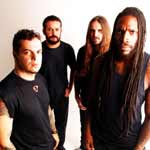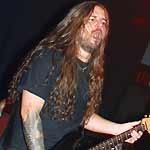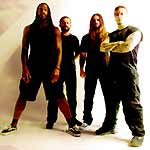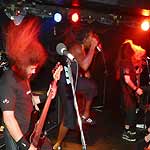| Welcome to the LOUDEST DOT COM ON THE PLANET! | |
 |

|
| Welcome to the LOUDEST DOT COM ON THE PLANET! | |
 |

|
Kerbyís Exclusive Interview With Guitarist Andreas Kisser of Sepultura By Jeff Kerby, Contributor Saturday, August 2, 2003 @ 0:00 AM
 This time around, Sepultura sets its sights on the world and the turmoil in it. Classically trained axeman Andreas Kisser and company want you to think and be aware of the chaos that abounds today. For those of you who want your politics separated from your music, it needs to be noted that musicians are actually people and citizens who have opinions on world events just as you do. Should it mean any more? Maybe not, but the fact is that many of them have a forum to express themselves and reach those who are interested in their views. If you find yourself wanting to dismiss musicians that express their disdain for ďpresidentĒ Bush as nothing more than obscene ramblings uttered by raging radicals, maybe you should consider why it is that you feel so threatened by it. You see, nothing is as obscene as standing around silently as two or three American soldiers get killed each day in a war they should have never had to fight in the first place initiated by a president who didnít even win an election. The world expects that type of behavior from other countriesóthey donít expect it from the United States.
KNAC.COM: How strange has it been to tour given that the new album, Roorback, hasnít been released stateside yet?
This time around, Sepultura sets its sights on the world and the turmoil in it. Classically trained axeman Andreas Kisser and company want you to think and be aware of the chaos that abounds today. For those of you who want your politics separated from your music, it needs to be noted that musicians are actually people and citizens who have opinions on world events just as you do. Should it mean any more? Maybe not, but the fact is that many of them have a forum to express themselves and reach those who are interested in their views. If you find yourself wanting to dismiss musicians that express their disdain for ďpresidentĒ Bush as nothing more than obscene ramblings uttered by raging radicals, maybe you should consider why it is that you feel so threatened by it. You see, nothing is as obscene as standing around silently as two or three American soldiers get killed each day in a war they should have never had to fight in the first place initiated by a president who didnít even win an election. The world expects that type of behavior from other countriesóthey donít expect it from the United States.
KNAC.COM: How strange has it been to tour given that the new album, Roorback, hasnít been released stateside yet? KISSER: It hasnít really been a problem. We just do about two songs from it, we did the same thing in Europe as well, even though Sepultura already has a record label there and everything. We just didnít want to force any situationówe just wanted people to go out and enjoy the gigs because we hadnít played in the U.S. for about two years or so. Itís good to play the songs that all the people know and include the new ones slowly. So far, the reaction has been great. KNAC.COM: Many of your new press releases define a roorback as ďa false or slanderous quote used for political advantage.Ē What specifically led the band to use this as the title for the new record?  KISSER: We really wanted to find a unique nameónot something that was too specific or that gave away too much. Roorback was a name that our webmaster came up with after surfing around the net, and we just thought that was a really strong name with a strong meaning. The twelve songs we have on the album talk pretty much about whatís going on today. They talk about the whole political situation and how it is affecting the world. We are a band that travels a lot depending on passports and visas, and we feel that anything that happens in the world has a consequence to everybody sooner or later. We just feel that the title Roorback represents pretty well the world that we live in nowadays.
KNAC.COM: Is it odd for you to tour here in the U.S. given the negative perception that much of the world seems to have about us due to the Iraqi invasion?
KISSER: We really wanted to find a unique nameónot something that was too specific or that gave away too much. Roorback was a name that our webmaster came up with after surfing around the net, and we just thought that was a really strong name with a strong meaning. The twelve songs we have on the album talk pretty much about whatís going on today. They talk about the whole political situation and how it is affecting the world. We are a band that travels a lot depending on passports and visas, and we feel that anything that happens in the world has a consequence to everybody sooner or later. We just feel that the title Roorback represents pretty well the world that we live in nowadays.
KNAC.COM: Is it odd for you to tour here in the U.S. given the negative perception that much of the world seems to have about us due to the Iraqi invasion? KISSER: No, I mean the people who are involved in the war are a minority. The elections were already a confusing thing, and since George Bush has come to power, the whole American attitude towards the Kyoto Protocol and towards Israel and Palestine and now in Iraq is just very aggressive. I donít think all the American people support that. We have a lot of friends in America, and I lived for eight years in Arizonaóone of my sons was even born in Scottsdale. America is a beautiful place. It is a beautiful country. Itís just unfortunate that you have the leaders that you have. We just have a volatile mixture of leaders in the world right now. Itís very dangerous. I donít mean to blame the American people either. The elections were very confusing and very difficult to understand. Since then, everything seems to be kind of weird. The protests around the world--and even within the US--seem to show that people are against war and violence. KNAC.COM: Especially one in which a large country is perceived as picking on a smaller one due to either misinformation, questionable motives or both. Everyone knows that if all weíre there to do is ďliberateĒ the Iraqi people, then there are plenty of other corrupt countries with citizens in need besides that one which coincidently just so happens to have a large quantity of oil and cash. KISSER: Yeah, Indonesia is about a thousand times worse than Iraq. Itís just politics and the whole roorback thing where people are planting lies and situations to carry out their objectives. Itís been good to go back though after two years and see that some of the people are still sane. Talking to Americans, you realize that not everyone is blinded by this type of attitude. KNAC.COM: Since Sepultura is a band with ties to so many countries, how do you see the US metal market as differing from that which is found in other countries?
KISSER: Yeah, actually it doesóespecially since we havenít played here for so long, and the last album wasnít promoted very well. In America, it seems that if you go away for too long, there is a tendency for you to be forgotten really easily. The fans' enthusiasm though has given us fresh motivation and insight to continue to do what weíve been doing. KNAC.COM: What do you see as being the biggest difference between playing big European metal festivals and something like Americaís Ozzfest? KISSER: I donít know, we did some big festivals in Europe, and we had a chance to play with Peter Gabriel, Alanis Morrisette, Rage Against the Machine and even Stingóall on the same stage. Thatís wonderful because itís great to have that type of mixture. In America, Lollapalooza tries to mix things up, but they still follow a certain style. Ozzfest seems to be more focused on metal and new metal. The biggest difference seems to be the diversity. KNAC.COM: Are Sting and Peter Gabriel two artists that you would say that you admire? KISSER: Definitely. KNAC.COM: I know that you have a classical background, and given that, do you think that metal musicians who play music as hard as yours are given the type of credit they deserve? KISSER: No, I donít think so. I donít think a lot of people see what we do as being music. They just think that itís noise, pretty much. In Brazil, I do a lot of extra stuff like play acoustic guitar with friends, and play blues with some other dudes. I try to play with other people and keep myself open to new ideas. I was playing some blues at a club one night, and this girl came up to me and said, ďWow, I didnít know you played guitar.Ē Itís a weird notion--metal doesnít get the credit it deserves. KNAC.COM: Do you feel free enough within the boundaries of Sepultura to express yourself while showcasing your own musical diversity?  KISSER: Yeah, definitely. Sepultura is very open. We try everythingópretty much. Weíve worked with Indian tribes, Japanese percussion groups and cello players, and itís great. Metal has only stayed around so long because of the various influences that have been brought into it, whether itís something as diverse as rap or country music. Metal is adaptable to pretty much any style. We feel free in Sepultura to do whatever we want, but by the same token, Iím not going to force blues or classical elements into Sepultura music just because Iím into it if it doesnít fit. You just have to know how and when to do it because you canít just be showing off out there. The music has to be respected.
KNAC.COM: Given that Sepultura is a band of the world with varied influences and lyrical content, could you speak a little bit about the song ďKaiowasĒ from Chaos A.D.?
KISSER: Yeah, definitely. Sepultura is very open. We try everythingópretty much. Weíve worked with Indian tribes, Japanese percussion groups and cello players, and itís great. Metal has only stayed around so long because of the various influences that have been brought into it, whether itís something as diverse as rap or country music. Metal is adaptable to pretty much any style. We feel free in Sepultura to do whatever we want, but by the same token, Iím not going to force blues or classical elements into Sepultura music just because Iím into it if it doesnít fit. You just have to know how and when to do it because you canít just be showing off out there. The music has to be respected.
KNAC.COM: Given that Sepultura is a band of the world with varied influences and lyrical content, could you speak a little bit about the song ďKaiowasĒ from Chaos A.D.?KISSER: It was a song that was very experimental for us at the time. We were trying to implement acoustic guitars and Brazilian elements and melodies into it. Because of that, we wanted to have a Brazilian theme to the song. Kaiowas is this tribe from the north that chose to end their own lives rather than give up to the white culture. They didnít want to mix with a dominant group. We thought that was a pretty strong attitude to have. The song was just a new step forward for the bandóit was a strong new attitude for us, too. KNAC.COM: Throughout the majority of Brazilís history, people havenít always felt free to express themselves without fear of repercussions. Whereas, in this country, we have always been taught that we have an unalienable right to freedom of speech. Do you think that Americans are truly free to speak their feelings? KISSER: No, not really. I think we saw that example with the Dixie Chicks and some actors in Hollywood. It was really scary. It just seemed like a censorship by the people driven by the media. Itís kind of weird to see such disrespect for another point of view. KNAC.COM: In your opinion, do you think the world sees us as being hypocritical? I mean, we censor anyone with a different point of view, we hold bogus, dirty elections and attack countries without the consent of the UN---is the world cognizant of the contradictions even if most of us arenít? KISSER: I think so. Definitely. The world media has a tendency to report all the bad stuffóthe conflicts, the shit that goes onóof course thatís part of the reason the majority of the people outside the US think of it this way. Itís seen as the arrogance, the great power of the world doing whatever they want whenever they want to do it. Itís a very dangerous attitude. Itís crazy because, as I said, my kid was born in Scottsdale, and this stuff can just go on for generations. This was just a seed planted for revenge in the future. Itís just fucked up.
KISSER: Of course. Thereís no doubt about it, man. KNAC.COM: That isnít a popular sentiment here though. The popular feeling is that we won, everyone should be happy, and now itís time to rebuild. KISSER: Itís cool though because in America, at the same time, you have guys like Michael Moore and Noam Chomsky who speak up and donít give a shit. They know how to gather information, and they really go after stuff. I think they show a pretty realistic picture of the country. Itís great to have that balance, but unfortunately a lot of people who disagree with the government donít have that type of input. The media pretty much refuses to bring that stuff out and put it on the table for discussion. KNAC.COM: Something that has gotten attention within metal has been the debate about Metallica and whether Jason Newsted should have left. After touring with Voivod, did you find yourself respecting his position about wanting to go back and play more aggressive style of music? KISSER: Yeah, in Metallica, I think he thought there was too much time without action. He tried to make songs and put lyrics in and stuff, but the monopoly of the situation was too much in the hands of James and Lars, pretty much. Jason is just such a musician. Heís so energetic and creative. Jason probably felt like he was in a cage or something. It seems like heís in a better place now. Heís more free and heís running his own label, doing the Voivod, doing the Ozzy shit. I think heís just enjoying himself now. KNAC.COM: Do you think Sepultura is more free now after the split with Max? Looking back, can you say that it may have been all for the best? KISSER: I donít know. The thing is, you canít ever just go and stop your life. You see a lot of bad stuff happening, and out of that it always seems like there are ten different ways to go. Really, it was the worst time of our lives, pretty much. It was just a shock, and we had to rebuild everything. We not only lost a singer, but we also lost a manager as well. Our structure was gone, and we kind of had to start from scratch. We just had to do the best we couldónot cry and sit around waiting for things to get better. KNAC.COM: You guys never did either. I mean, throughout the whole ordeal when Max was taking shots at Sepultura during interviews, your band never lashed back at him publicly. Why is that?  KISSER: We just didnít want to get involved in the whole gossip thing in the media. We knew that they would just want to make a big deal out of it. Of course, it was a big deal for us though, and for our fans, but to be responding to allegations would just be foolish from our perspective. Plus Max, in every magazine, he had a different version of the factsóto respond to all of them would be fucking stupid. The way to express anger and stuff is between closed doors and face to face. We did plenty of that, and in the end the snowball was too big to handle. To go out and try to resolve anything in the press is fucking the worst. We gave our point of view and the reason things were handled a certain way, and that was it. Then, we just started looking at our new careers and looking towards the future. I think it was very healthy for us to not be involved in all that gossip shit. I know we lost a lot of fans who believed in the things Max said, and even today some people are hurt with us because of some of the versions they heard.
KNAC.COM: Do you take it personally?
KISSER: We just didnít want to get involved in the whole gossip thing in the media. We knew that they would just want to make a big deal out of it. Of course, it was a big deal for us though, and for our fans, but to be responding to allegations would just be foolish from our perspective. Plus Max, in every magazine, he had a different version of the factsóto respond to all of them would be fucking stupid. The way to express anger and stuff is between closed doors and face to face. We did plenty of that, and in the end the snowball was too big to handle. To go out and try to resolve anything in the press is fucking the worst. We gave our point of view and the reason things were handled a certain way, and that was it. Then, we just started looking at our new careers and looking towards the future. I think it was very healthy for us to not be involved in all that gossip shit. I know we lost a lot of fans who believed in the things Max said, and even today some people are hurt with us because of some of the versions they heard.
KNAC.COM: Do you take it personally? KISSER: No, a lot of people will come around after a certain amount of time has passed. There are a lot of people who are now starting to understand the album, Roorback, and enjoy it without prejudice and without thinking, ďOh, I donít want to listen to that because they hurt MaxĒ or whatever. We knew it would take Derek awhile to improve and be more integrated into the band. We just took our time and worked and worked a lot. KNAC.COM: At least you wonít have those typical feelings of anger and guilt after having said hasty words in the pressó KISSER: Yeah, we cannot regret stuff like that. It isnít going to take you anywhere good. There was a lot of stuff that happened there in the heat of the moment, and we had to do what we felt was right at the time. Professionally, weíre all doing our stuff, but personally we never had a chance to sit and talk again. KNAC.COM: So there hasnít been any personal communication between the two camps since the split? KISSER: No, none at all.
| |||||||||
|
|
| Recent Features |
 |